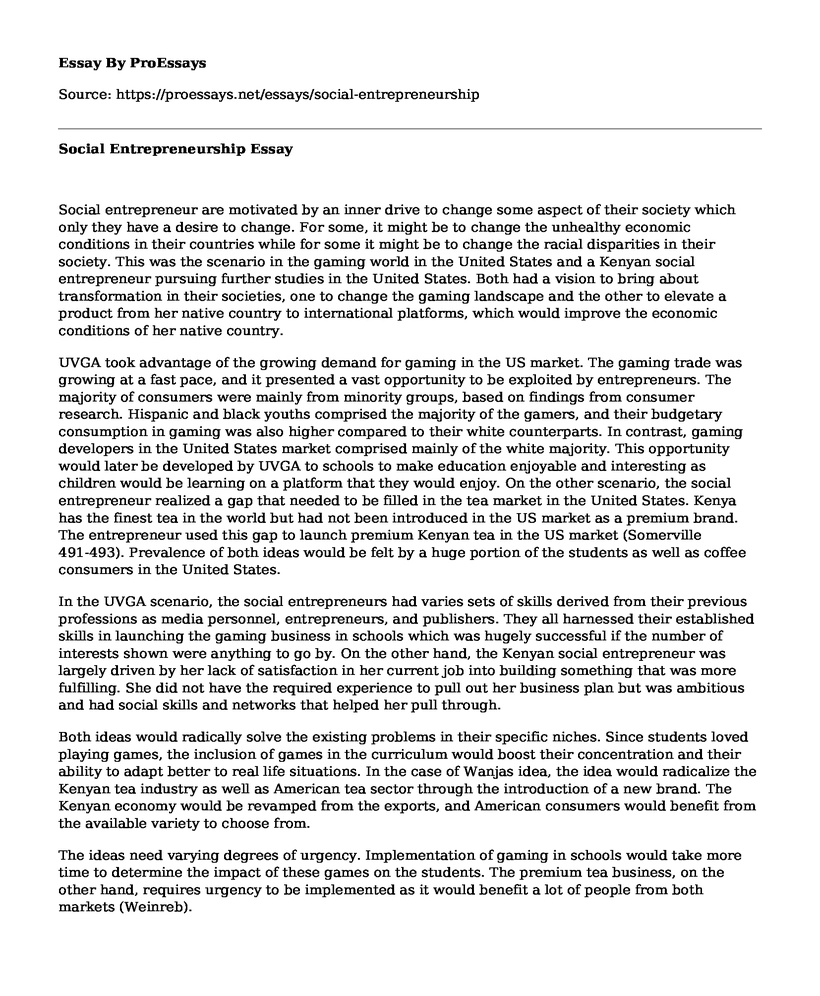Social entrepreneur are motivated by an inner drive to change some aspect of their society which only they have a desire to change. For some, it might be to change the unhealthy economic conditions in their countries while for some it might be to change the racial disparities in their society. This was the scenario in the gaming world in the United States and a Kenyan social entrepreneur pursuing further studies in the United States. Both had a vision to bring about transformation in their societies, one to change the gaming landscape and the other to elevate a product from her native country to international platforms, which would improve the economic conditions of her native country.
UVGA took advantage of the growing demand for gaming in the US market. The gaming trade was growing at a fast pace, and it presented a vast opportunity to be exploited by entrepreneurs. The majority of consumers were mainly from minority groups, based on findings from consumer research. Hispanic and black youths comprised the majority of the gamers, and their budgetary consumption in gaming was also higher compared to their white counterparts. In contrast, gaming developers in the United States market comprised mainly of the white majority. This opportunity would later be developed by UVGA to schools to make education enjoyable and interesting as children would be learning on a platform that they would enjoy. On the other scenario, the social entrepreneur realized a gap that needed to be filled in the tea market in the United States. Kenya has the finest tea in the world but had not been introduced in the US market as a premium brand. The entrepreneur used this gap to launch premium Kenyan tea in the US market (Somerville 491-493). Prevalence of both ideas would be felt by a huge portion of the students as well as coffee consumers in the United States.
In the UVGA scenario, the social entrepreneurs had varies sets of skills derived from their previous professions as media personnel, entrepreneurs, and publishers. They all harnessed their established skills in launching the gaming business in schools which was hugely successful if the number of interests shown were anything to go by. On the other hand, the Kenyan social entrepreneur was largely driven by her lack of satisfaction in her current job into building something that was more fulfilling. She did not have the required experience to pull out her business plan but was ambitious and had social skills and networks that helped her pull through.
Both ideas would radically solve the existing problems in their specific niches. Since students loved playing games, the inclusion of games in the curriculum would boost their concentration and their ability to adapt better to real life situations. In the case of Wanjas idea, the idea would radicalize the Kenyan tea industry as well as American tea sector through the introduction of a new brand. The Kenyan economy would be revamped from the exports, and American consumers would benefit from the available variety to choose from.
The ideas need varying degrees of urgency. Implementation of gaming in schools would take more time to determine the impact of these games on the students. The premium tea business, on the other hand, requires urgency to be implemented as it would benefit a lot of people from both markets (Weinreb).
As governments in both cases were not able to address the social problems, the ideas by these social entrepreneurs are highly accessible. The government did not address the learning problems at schools, which UVGA stepped in. The Kenyan government was not able to do efficient marketing, necessitating the social entrepreneur to step in the gap.
Work Cited
Somerville, Deidra M. "Understanding Social Entrepreneurship: The Relentless Pursuit Of Mission In An Ever-Changing World, By Kickul, J., & Lyons, T. S.". Journal of Community Practice 22.4 (2014): 491-493. Web.
Weinreb, Ellen. "5 Core Competencies Of Sustainability Leadership". GreenBiz. N.p., 2015. Web. 22 Sept. 2016.
Cite this page
Social Entrepreneurship. (2021, Mar 23). Retrieved from https://proessays.net/essays/social-entrepreneurship
If you are the original author of this essay and no longer wish to have it published on the ProEssays website, please click below to request its removal:
- Paper Example on Theme of Social Status in Black Mirror
- Coca Cola As A Multinational Beverage Company - Assignment Example
- Investing in IBM Company Paper Example
- Essay Sample on Business and Entrepreneurship
- Global Trade: Connectivity Breaks Down Barriers - Essay Sample
- Essay Sample on The Heartbreak Illusion: Kathryn Schulz on Expectations and Relationships
- Essay Example on Role of Laws in Society: Complexities of Regulating Social Norms







